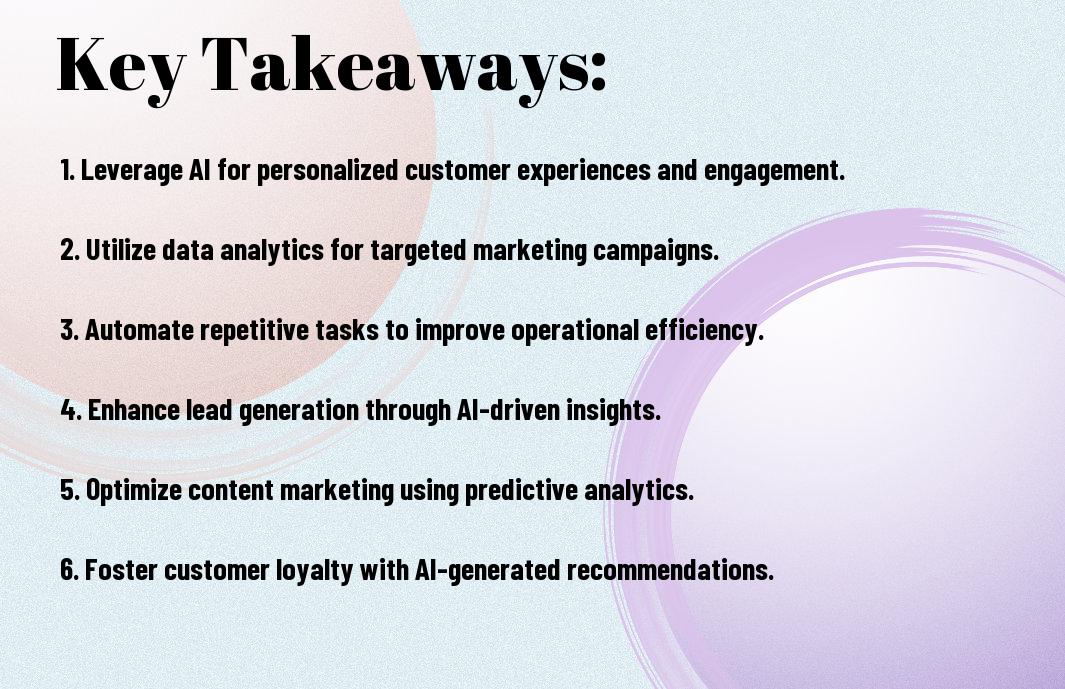As you navigate the ever-evolving landscape of business, you’re likely aware of the significant impact artificial intelligence (AI) is having on marketing strategies. You’re looking to leverage AI to expand your business, and for good reason – it can help you personalize customer experiences, optimize campaigns, and gain valuable insights. Your ability to harness the power of AI will be key to staying ahead of the competition and driving growth in today’s fast-paced market.
Key Takeaways:
- The integration of AI in marketing enables businesses to analyze vast amounts of data, providing valuable insights that can inform strategic decisions and drive expansion through personalized customer experiences.
- AI-powered marketing tools can automate routine tasks, such as data analysis and campaign optimization, allowing marketers to focus on creative and high-value tasks that contribute to business growth.
- Businesses can leverage AI-driven chatbots and virtual assistants to enhance customer engagement, offering 24/7 support and improving the overall customer journey, which is crucial for building brand loyalty and driving expansion.
- AI can help marketers predict customer behavior and preferences, enabling them to develop targeted campaigns that resonate with their audience and increase the likelihood of conversion, ultimately contributing to business expansion.
- As AI continues to evolve, businesses must stay up-to-date with the latest developments and trends in AI marketing to remain competitive and capitalize on new opportunities for growth and expansion in the market.

The Current AI Marketing Landscape
Before exploring into the strategies for business expansion, it’s important to understand the current state of AI in marketing, and how you can leverage it to enhance your business operations and customer engagement.
Key Technologies Driving Change
For instance, technologies like machine learning and natural language processing are transforming the marketing landscape, enabling you to personalize your marketing efforts and improve customer interactions, allowing you to stay ahead of the competition.
Market Adoption Rates
Meanwhile, market trends indicate that you are likely to see a significant increase in AI adoption across various industries, and understanding these trends will help you make informed decisions about your own marketing strategy.
Marketing teams are increasingly relying on AI-powered tools to analyze customer data, predict behavior, and create targeted campaigns, and as you explore the current market adoption rates, you’ll notice that early adopters are already experiencing significant benefits, including improved efficiency and increased ROI, which can help you to plan your own AI marketing strategy effectively.
Data-Driven Customer Insights
One of the key benefits of AI in marketing is the ability to gather and analyze large amounts of customer data, providing you with valuable insights to inform your business decisions. You can use this data to better understand your target audience, identify trends, and develop effective marketing strategies.
Predictive Analytics Applications
Beneath the surface of AI-powered marketing lies a wealth of predictive analytics applications, enabling you to forecast customer behavior and make data-driven decisions. You can leverage these tools to optimize your marketing campaigns, improve customer engagement, and drive business growth.
Consumer Behavior Pattern Recognition
Along with predictive analytics, AI-powered marketing also involves recognizing patterns in consumer behavior, allowing you to tailor your marketing efforts to meet the unique needs of your target audience. You can use this information to create personalized marketing campaigns, increasing the likelihood of conversion and customer loyalty.
Predictive models can help you research deeper into consumer behavior pattern recognition, enabling you to identify complex patterns and trends in customer data. You can use this information to develop targeted marketing strategies, anticipating customer needs and preferences, and staying ahead of the competition in your industry, ultimately driving your business expansion and revenue growth.

AI-Powered Personalization Strategies
Despite the complexity of implementing AI in marketing, you can leverage its power to create personalized experiences for your customers, leading to increased engagement and loyalty. By utilizing AI algorithms, you can analyze customer data and tailor your marketing efforts to individual preferences, resulting in more effective campaigns.
Dynamic Content Delivery
Prior to developing a personalization strategy, you should consider dynamic content delivery, which enables you to serve relevant content to your audience based on their behavior, location, and demographics, allowing you to connect with them on a deeper level.
Real-Time Customization Tools
By utilizing real-time customization tools, you can adjust your marketing messages and offers in the moment, ensuring that your customers receive the most relevant information, thereby enhancing their experience and fostering a stronger connection with your brand.
Personalization through real-time customization tools enables you to respond to customer interactions instantly, allowing you to capitalize on moments of high engagement and maximize the impact of your marketing efforts, ultimately driving more conversions and boosting your revenue, as you tailor your approach to meet the unique needs and preferences of your target audience.
Automation of Marketing Processes
Now, as you explore the intersection of AI and marketing, you’ll find that automation is a key aspect, allowing you to streamline tasks and focus on strategy, learn more about The Intersection of Marketing and Technology to improve your approach.
Workflow Efficiency Improvements
Around the time you implement automation, you’ll notice significant improvements in your workflow efficiency, enabling your team to handle more tasks and focus on high-priority projects.
Resource Allocation Benefits
To maximize your marketing efforts, you’ll need to allocate resources effectively, and automation can help you achieve this by identifying areas where you can optimize your budget and personnel.
Considering the benefits of resource allocation, you’ll be able to redirect your resources to high-return activities, such as strategy development and creative content creation, allowing you to drive more effective marketing campaigns and expand your business reach.
Measuring AI Marketing ROI
Keep track of your AI marketing efforts’ effectiveness by monitoring key performance indicators, such as conversion rates and customer engagement. This helps you understand the impact of AI on your marketing strategy and make data-driven decisions to optimize your approach.
Performance Metrics That Matter
Across various channels, you can measure metrics like click-through rates, open rates, and bounce rates to gauge the success of your AI-driven marketing campaigns, allowing you to refine your strategy and improve your ROI.
Attribution Models
Models like last-touch and multi-touch attribution help you assign value to each touchpoint in your customer’s journey, enabling you to understand how your AI marketing efforts contribute to conversions and revenue.
With attribution models, you can analyze the effectiveness of your AI marketing campaigns and allocate your budget more efficiently, ensuring that your marketing spend is aligned with your business goals, and you can make informed decisions to optimize your AI marketing strategy for better outcomes.
Implementation Challenges
Your business may face several obstacles when integrating AI into your marketing strategy, including technical and skill-based hurdles that can hinder your progress.
Technical Integration Hurdles
Among the primary concerns is ensuring seamless integration with existing systems, which can be complex and time-consuming, requiring significant resources and expertise to overcome.
Team Skill Development Needs
Beside the technical aspects, your team’s ability to work with AI-powered tools is important, and you will need to assess their skills and provide training to ensure they can effectively leverage these technologies.
Also, as you develop your team’s skills, you will need to consider the ongoing learning and professional development required to keep pace with the rapidly evolving AI landscape, ensuring your team remains proficient in the latest tools and techniques to drive your marketing strategy forward.
Conclusion
On the whole, you now have a deeper understanding of the intersection of AI and marketing, and how to leverage this synergy for your business expansion. You can apply these strategies to enhance your marketing efforts, drive growth, and stay ahead of the competition. By embracing AI-powered marketing tools, you will be able to make data-driven decisions, personalize your customer experience, and ultimately boost your bottom line, taking your business to the next level.
FAQ
Q: What role does Artificial Intelligence (AI) play in modern marketing strategies, and how can businesses leverage it for expansion?
A: Artificial Intelligence (AI) plays a significant role in modern marketing strategies by enabling businesses to analyze large datasets, predict consumer behavior, and personalize customer experiences. Businesses can leverage AI for expansion by implementing AI-powered tools for marketing automation, chatbots for customer service, and predictive analytics to inform decision-making. Additionally, AI-driven content creation and social media management can help businesses reach a wider audience and improve brand engagement. By integrating AI into their marketing strategies, businesses can enhance efficiency, reduce costs, and drive revenue growth.
Q: How can businesses effectively integrate AI into their existing marketing frameworks to enhance customer engagement and experience?
A: Businesses can effectively integrate AI into their existing marketing frameworks by first identifying areas where AI can add the most value, such as data analysis, customer service, or content creation. Next, they should invest in AI-powered marketing tools and platforms that can seamlessly integrate with their current systems. It’s also imperative to develop a comprehensive data strategy to ensure that AI algorithms have access to high-quality, relevant data. Furthermore, businesses should focus on transparency and ethics when using AI, ensuring that customers understand how their data is being used and that AI-driven interactions are personalized and respectful. By taking a strategic and customer-centric approach to AI integration, businesses can enhance customer engagement, improve experience, and drive long-term loyalty.
Q: What are some potential challenges and limitations that businesses may face when implementing AI in their marketing strategies, and how can these be overcome?
A: Businesses may face several challenges when implementing AI in their marketing strategies, including data quality issues, lack of transparency in AI decision-making, and the need for significant upfront investment in AI technology and talent. Additionally, there may be concerns about job displacement and the potential for AI to lack the nuance and creativity of human marketers. To overcome these challenges, businesses should prioritize data quality and governance, invest in explainable AI technologies, and develop a strategic roadmap for AI adoption that aligns with their overall business goals. It’s also important to foster a culture of innovation and experimentation, where marketers can work alongside AI systems to enhance their capabilities and address potential limitations. By addressing these challenges proactively, businesses can maximize the benefits of AI in marketing and achieve sustainable growth and expansion.



